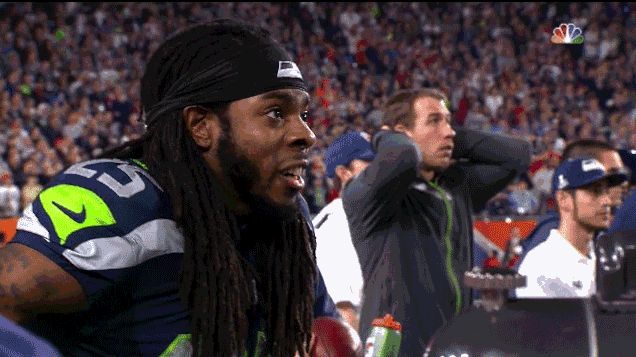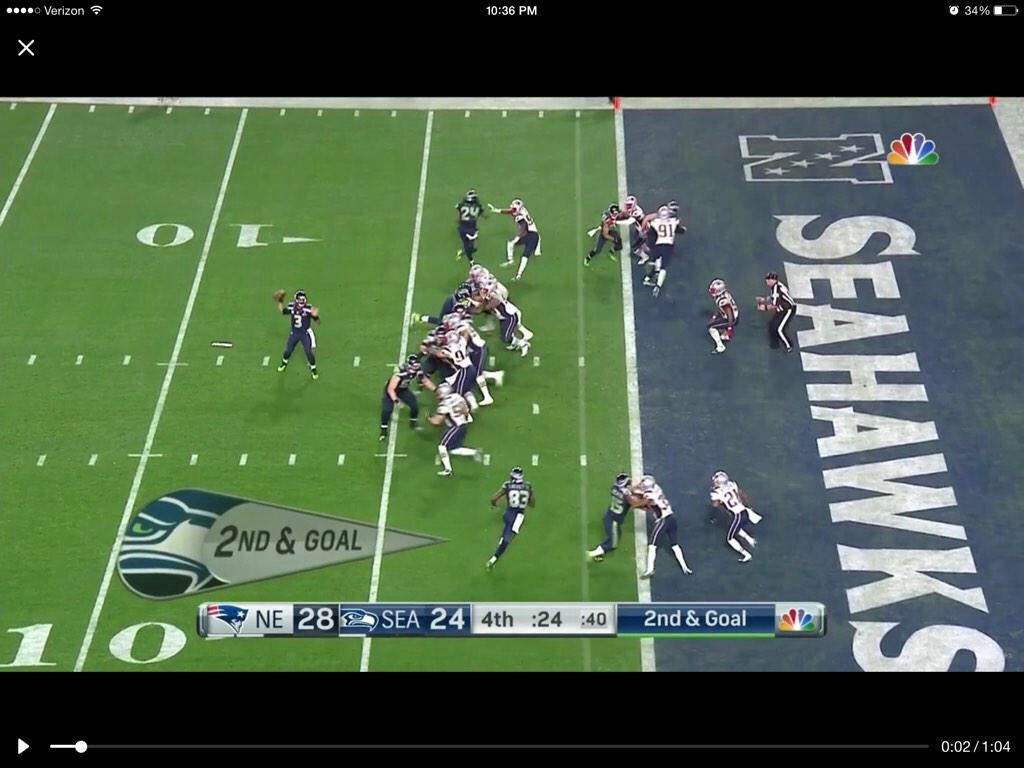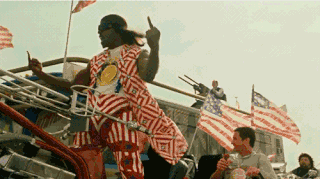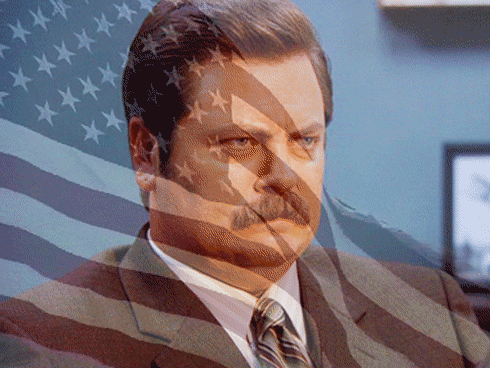 "ttyymmnn" (ttyymmnn)
"ttyymmnn" (ttyymmnn)
02/02/2015 at 23:17 • Filed to: None
 1
1
 22
22
 "ttyymmnn" (ttyymmnn)
"ttyymmnn" (ttyymmnn)
02/02/2015 at 23:17 • Filed to: None |  1 1
|  22 22 |
The NYT has an interesting article about the Pete Carroll's decision to pass on the goal line as it pertains to game theory. They conclude that passing may not have been the wrong call after all. It's all about randomness and keeping the other team guessing. Which makes me think tat maybe they should have gone play action. This article may be stuck behind a paywall for you, but it's worth clicking.
It's the biggest moment in your N.F.L. coaching career: 26 seconds remain in the !!!error: Indecipherable SUB-paragraph formatting!!! , your team is 4 points behind, you have the ball just one yard short of the end zone, it's second down, and your team has arguably the N.F.L.'s best running back. What's your call? Run or pass?
!!! UNKNOWN CONTENT TYPE !!!
 Dr. Zoidberg - RIP Oppo
> ttyymmnn
Dr. Zoidberg - RIP Oppo
> ttyymmnn
02/02/2015 at 23:21 |
|
No. It was fucking stupid.
Roll out and high-lob it to back corner? Maybe.
What they actually called? Fuck no.
EDIT: Sorry, it's still Monday for me :D
 fhrblig
> ttyymmnn
fhrblig
> ttyymmnn
02/02/2015 at 23:23 |
|
You can call a pass at the 1-yard line, but if you do it between the hashes you're asking for trouble. And they were.
 Dr. Zoidberg - RIP Oppo
> ttyymmnn
Dr. Zoidberg - RIP Oppo
> ttyymmnn
02/02/2015 at 23:25 |
|

 DrJohannVegas
> ttyymmnn
DrJohannVegas
> ttyymmnn
02/02/2015 at 23:29 |
|
The penultimate paragraph is the important one: mixed strategies "work" through expected outcomes, and therefore assume repeated play of the same game. Plus, this article ensures that this play will enter the canon of game theory instruction over the next few semesters.
{puts nerd hat on}
Now, I have to disagree with Prof. Wolfers on one point: the characterization of each play as a simultaneous game without strict dominance of a strategy or mixed strategy which excludes some options, like the Rock, Paper, Scissors game. For a number of reasons (including the outcome which we observed, a turnover), the game is better considered as a dynamic/sequential one. Outcomes in the previous round of play significantly shape the payoffs in the next round.
My preferred football/econ paper is David Romer's "It's Fourth Down and What Does the Bellman Equation Say?" ( http://eml.berkeley.edu/~dromer/papers… ) It's a study of fourth-down plays, but it does a "better" job of dealing with the dynamics of the game.
{takes nerd hat off}
 qbeezy
> ttyymmnn
qbeezy
> ttyymmnn
02/02/2015 at 23:30 |
|
The one problem with that is that the slant didn't keep the patriots guessing. Seattle it's notorious for pic plays. They run them just as much as Oregon. A fade to the pylon? That would keep the pats on their toes. Not a pass play they have been shutting down all night.
 Leadbull
> ttyymmnn
Leadbull
> ttyymmnn
02/02/2015 at 23:45 |
|
I think it was a good call, but poorly executed by the receivers and perfectly executed by Browner and (especially) Butler.
It was a pick play. Kearse and Lockette lined up next to each other; Kearse was supposed to rub on Lockette's man in order to create separation, but Browner jammed him hard... he couldn't do crap. And then Butler made an incredible break on the ball.
This is what Wilson saw when he let it fly:

I thought they were going to run a play action roll-out, since Wilson on the move with man coverage is always dangerous. But I'm not an NFL coach, so I won't try to tell Darren Bevell what plays he should call.
 ly2v8-Brian
> Leadbull
ly2v8-Brian
> Leadbull
02/02/2015 at 23:53 |
|
Excellent breakdown. I knew they were going to pass, because everyone would expect the run there's a good chance that Lynch gets stuffed and they have to use a timeout. This grab shows an open receiver with more than enough open field to get the score. It was executed well, but Butler executed a read FLAWLESSLY.
 ly2v8-Brian
> Dr. Zoidberg - RIP Oppo
ly2v8-Brian
> Dr. Zoidberg - RIP Oppo
02/02/2015 at 23:54 |
|
I believe you are thinking of a fade.
 fhrblig
> Dr. Zoidberg - RIP Oppo
fhrblig
> Dr. Zoidberg - RIP Oppo
02/02/2015 at 23:56 |
|
Every time I see this I hear Cartman in my head screaming "YOUR TEARS OF UNFATHOMABLE SADNESS ARE DELICIOUS!"
 Leadbull
> ly2v8-Brian
Leadbull
> ly2v8-Brian
02/03/2015 at 00:00 |
|
Yeah, they basically had to pass. In retrospect, Beliballs knew exactly what he was doing when he let the clock run down. He played to win, and forced their hand.
What Bevell really screwed up was the organization of that entire drive. Apparently, Matthews couldn't get out on the field because of some packaging issues? They also had to burn an unnecessary timeout after the WTCatch.
 ly2v8-Brian
> Leadbull
ly2v8-Brian
> Leadbull
02/03/2015 at 00:03 |
|
It's such a wonderfully complicated sport.
 ly2v8-Brian
> ttyymmnn
ly2v8-Brian
> ttyymmnn
02/03/2015 at 00:06 |
|
I think it was the right idea, but I would've gone with a different play.
 Leadbull
> ly2v8-Brian
Leadbull
> ly2v8-Brian
02/03/2015 at 00:11 |
|
'Merica
 ly2v8-Brian
> Leadbull
ly2v8-Brian
> Leadbull
02/03/2015 at 00:12 |
|

 Dr. Zoidberg - RIP Oppo
> Leadbull
Dr. Zoidberg - RIP Oppo
> Leadbull
02/03/2015 at 00:30 |
|
Dat telegraph
 Leadbull
> ly2v8-Brian
Leadbull
> ly2v8-Brian
02/03/2015 at 00:30 |
|

 Leadbull
> Dr. Zoidberg - RIP Oppo
Leadbull
> Dr. Zoidberg - RIP Oppo
02/03/2015 at 00:32 |
|
Not really. That wasn't even a three step drop.
He caught the snap, then let it go immediately.
 ly2v8-Brian
> Leadbull
ly2v8-Brian
> Leadbull
02/03/2015 at 00:33 |
|

 wiffleballtony
> ttyymmnn
wiffleballtony
> ttyymmnn
02/03/2015 at 01:04 |
|
I wonder how much it cost Pete to sponsor that article. Seriously even a pop warne coach knows that passing plays in the red zone are even higher risk than anywhere else and especially if you only need a yard.
 BJohnson11
> ttyymmnn
BJohnson11
> ttyymmnn
02/03/2015 at 02:26 |
|
My take on it is very similar to Leadbull's. I think the pass wasn't the wrong call. Were it 4th down and they passed from the 1? Totally insane, but on second down, with that much time left and a timeout, it made sense to not run it. There were still two more chances after the pass, and nobody was expecting the pass to get intercepted.
Now, I would have, like Leadbull said, rolled Wilson out and thrown the ball to the edges away from the heart of the defense, and if nothing was there, throw it away, but the snap shot Leadbull shows clearly shows why Wilson threw it. A combination of a bad throw, not quite enough effort from the receiver, a great play by Butler, and all of a sudden everyone is calling for Bevell and Carrolls head. It's actually quite disappointing to see and hear how the Seahawks players reacted to it (basically throwing Carroll/Bevell under the bus) as well as how media/former players (Emmitt Smith comes to mind) came out bashing it. I think if everyone stepped back they'd see it really wasn't "the worst call in the history of the NFL".
 Manny05x
> ttyymmnn
Manny05x
> ttyymmnn
02/03/2015 at 07:27 |
|
my theory is they did not want lynch to win mvp.
 GhostZ
> ttyymmnn
GhostZ
> ttyymmnn
02/04/2015 at 08:58 |
|
This is not game theory, or at least, not properly applied game theory.
(EDIT: Ah, Kinja, thank you for sending me to an article that's old. Disregard.)